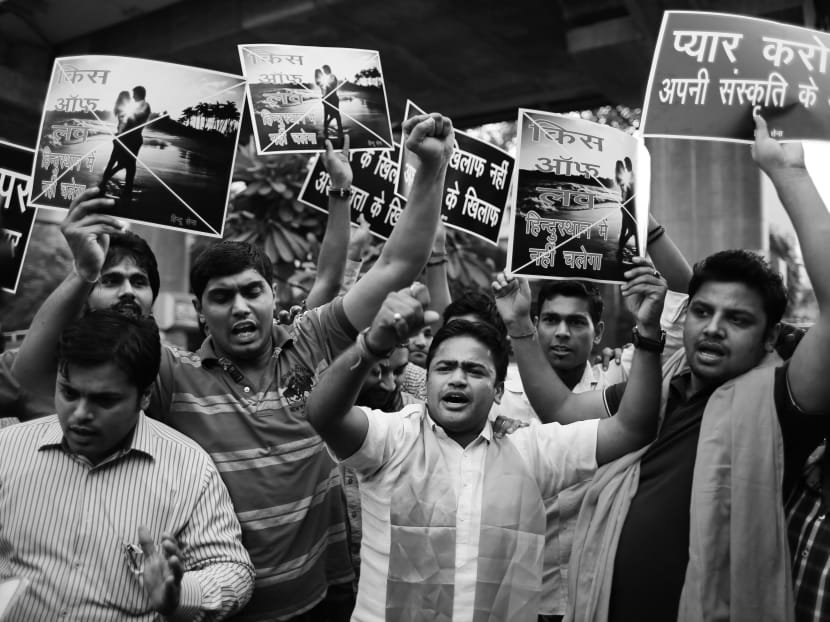Why a kiss is never just a kiss in India
Early this month, public-minded Indian citizens moved swiftly to crack down on a grave threat to Indian culture. The provocation took the form of a sudden epidemic of kissing that broke out in the south Indian city of Kochi; had it not been rooted out at the source, it might have spread to the rest of the country.


Early this month, public-minded Indian citizens moved swiftly to crack down on a grave threat to Indian culture. The provocation took the form of a sudden epidemic of kissing that broke out in the south Indian city of Kochi; had it not been rooted out at the source, it might have spread to the rest of the country.
When word got out that a group of citizens planned to assemble last Sunday evening in Kochi to kiss in public to protest against the rise of India’s “morality police”, hundreds of others, including workers from a range of political parties, also headed to the site to prevent such an outrageous display. Even more came not to participate but to watch the spectacle of the kissers and the cussers clashing.
This gave the Indian police — which is, in Kochi as in everywhere else, not sympathetic to kissing — an excuse to book the kiss-protesters for disturbing the peace. And so, with a little help from the law, the dominant current of Indian society that frowns upon displays of sexual affection in public emerged victorious against the forces of anarchy, perversion, disrespect and “freedom”, not to mention premarital sex, live-in relationships and AIDS (of which provocative public kissing is an unmistakable portent).
Indians of a liberal persuasion were left asking: What legal justification can people have, in a democracy, to forcibly separate other citizens from a lip-lock in a public place?
To this, Indian culture responds that the question is itself an ignorant and prejudiced one. In any society, there are certain activities that are expressly prohibited by law and another set of transgressions so self-evidently unacceptable in the light of custom and common sense — though from the standpoint of modernist political values, hard to establish in their illegality — that they sadden the just and the good, and when allowed to spread unchecked, they become a cancer eating the world away from within. And so, the most moral souls of that world are always at work to stop them.
These flag-bearers of India’s traditional wisdom believe that kissing in public, like homosexuality, is something unnatural, probably learned from the godless West. Those who protested so vociferously against Kiss Day in Kochi actually believe themselves to be quite sophisticated in their understanding of the tension between self-expression and self-restraint and were at pains to point out that they do not object to people kissing per se, only to kissing in public. “Do whatever you want behind closed doors,” they argue. “Kissing in public has never been part of Indian culture.”
SEX, YES; KISSING, NO
Ordinarily, I would have disagreed with them. But the lack of a life-giving romantic spark in my own life led me to a new sympathy with the kiss-crushers. I spent the days after the protest locked up in the India section of my local library studying the evidence and listening to elders pontificate and I left with an important new theory: Briefly, the opponents of kissing in public have been too kind. The truth is that kissing — whether in private or public, light or dark, across the sexes or within them — entirely unmodified by physical environment or historical era, has no precedent or sanction in Indian life.
There is no record of any person kissing another in any of the great Indian epics nor are there any depictions of a kiss in any ancient Indian art. Lovers loved, but never kissed. Sexual intercourse is allowed by Indian culture — within the framework of marriage by members of different sexes but the same religion and, preferably, caste as a means principally of contributing to the perpetuation of society. But from the very beginning, kissing was cordoned off and made taboo, a dangerous example of pleasure for its own sake. Insofar as kissing played any part in human life, it was as part of a subculture of extreme libertinism and debauchery confined to cults or dissolute elites, such as those described in the Kama Sutra or the erotic sculptures of Khajuraho and Konark.
Until fairly recently, even Bollywood films, while full of unseemly pawing and pelvic thrusts, traditionally cut away when the faces of lovers came within inches of each other. Western people thought this was because of a general squeamishness in society about the depiction of kissing, never realising that no, people just never kissed!
Indian love is so profound, so respectful of the members of society who may be watching or elders in a family who have trusted two young people enough to leave them all alone by themselves that it never actually acts on its impulses. Everything romantic is left to the imagination — not only of the viewer, but also the participant.
Without such an ethic of extreme self-restraint and sublimated yearning (much though it may seem to the wider world as repression and inhibition), Indian culture could never have established its unique place in the world. It is the one culture that appears never to have evolved or reconsidered essential questions, as lesser ones did, but to have arrived complete and fully formed at the very beginning of time, requiring thereafter only the input of total obedience to achieve universal happiness.
Can traditional Indian culture really be so inimical not only to kissing in public, but also to simple independence of mind, to a minimally adult view of human diversity, choice, pleasure and freedom? Perhaps (just as with the frog in the fairy tale) the liberation of Indian culture from its own psychological torments and writhing rationalisations will come from a kiss — or a storm of them. BLOOMBERG
ABOUT THE AUTHOR:
Chandrahas Choudhury is a novelist based in New Delhi.









